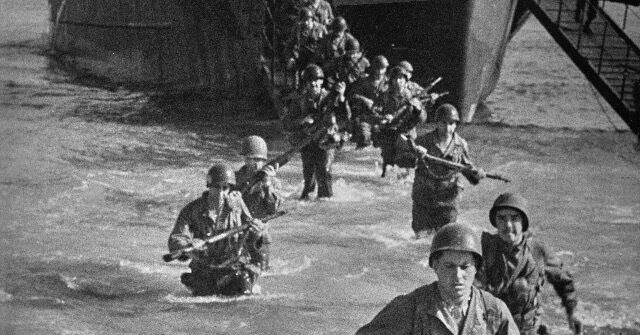On this day, 81 years ago, tens of thousands of young men from ordinary backgrounds hit the beaches of Normandy and faced the most intense fire any group of attackers has ever faced in the history of modern warfare.
However, not all of the men who hit the beach that day came from ordinary backgrounds, and not all of them were young.
At the age of 56, Brigadier General Teddy Roosevelt Jr. was the oldest soldier to hit the beach during Operation Overlord, the codename for the largest amphibious invasion in the history of warfare, the Allied invasion of Europe. As his name suggests, he didn’t come from an ordinary background either. Instead, he was the son of the “Rough Rider” himself, Teddy Roosevelt.
A position, along with his rank, that conferred upon him tremendous status and privilege and would have shielded him from any even remote danger that day, much less the killing sands of Utah Beach.
But Roosevelt Jr. didn’t just fight at Normandy. He had to fight to get to Normandy.
A veteran of World War I, Roosevelt was among the first Americans to land in France and saw action at the Battle of Cantigny. Roosevelt reenlisted at the start of World War II. He saw action quickly, leading amphibious assaults during Operation Torch—the invasion of North Africa—as well as the landings in Sicily and Italy.
However, despite his experience and willingness to fight, the higher-ups weren’t convinced the 56-year-old was ready for the chaos anticipated at Normandy.
As Claire Barrett writes, “Well-liked and respected by his men, Roosevelt had to campaign hard, however, to deploy during the invasion of Normandy. His superior officer, Major General Raymond ‘Tubby’ Barton initially rejected Roosevelt’s request to enter the European Theater and lead the 4th Infantry Division, 8th Infantry Regiment into combat. In a personal letter to Barton dated May 26, 1944, Roosevelt pleaded his case in seven succinct bullet points, noting that ‘I personally know both officers and men of these advance units and believe that it will steady them to know that I am with them.’ Barton eventually relented.”
Barton’s yielding paved the way for one of the most heroic battlefield exploits in the history of warfare.
With his Higgins boat roughly a mile off target from its intended landing spot at Utah Beach, Roosevelt purportedly shouted, “We’ll start the war from right here.”
Armed with a cane, a pistol, and having only recently recovered from a bout of pneumonia, Roosevelt guided soldiers from the landing craft to the beachhead as Germans rained a withering hail of machine gun fire and artillery from coastal batteries and inland field pieces.
Men confronted by enemy fire and disoriented by having been dropped off at the wrong locations, found themselves shepherded into the fight by a grizzled brigadier general (the highest-ranking American on the beach that day) who walked around upright and seemingly impervious to the hellstorm enveloping him and his men.
As one veteran sergeant of the 8th put it, Roosevelt walked the beach, “with a cane in one hand, a map in the other, walking around as if he was looking over some real estate.”
But it wasn’t just sergeants who were impressed by Roosevelt. Years later, General Omar Bradley, the overall American field commander for the invasion of Europe, was asked what the bravest thing he ever saw in battle was; he replied, “Ted Roosevelt on Utah Beach.”
Teddy Roosevelt Jr. was not the only Roosevelt to hit the beach that day. His son, Quentin, also came in wth the first wave to make them the only father-son team to take part in the historic landings.
Unfortunately, for the Roosevelts and America, the two would not live much longer.
Quentin would survive the war but die in a plane crash in 1948, as for Teddy Roosevelt Jr., he would die in Europe five weeks after his heroic exploits on D-Day, not from enemy fire, but from a heart attack. A result of one of the many health conditions that plagued him and nearly derailed his mission-saving presence on the beaches of Normandy.
“Roosevelt led the U.S. 4th Infantry Division’s 8th Infantry Regiment and 70th Tank Battalion as they fought their way inland. Despite being constantly bombarded by enemy fire, Roosevelt remained resolute,” Stephen Ruiz wrote for Military.com.
Three months after his death, Roosevelt was posthumously awarded the Medal of Honor. His citation reads:
He repeatedly led groups from the beach, over the seawall and established them inland. His valor, courage, and presence in the very front of the attack and his complete unconcern at being under heavy fire inspired the troops to heights of enthusiasm and self-sacrifice. Although the enemy had the beach under constant direct fire, Brigadier General Roosevelt moved from one locality to another, rallying men around him, directed and personally led them against the enemy. Under his seasoned, precise, calm, and unfaltering leadership, assault troops reduced beach strong points and rapidly moved inland with minimum casualties. He thus contributed substantially to the successful establishment of the beachhead in France.
Roosevelt is buried at the Normandy American Cemetery and Memorial in Colleville-sur-Mer, next to his brother Quentin, who was killed in World War I.
Read the full article here


